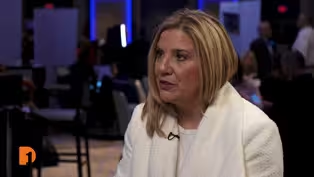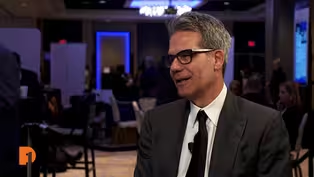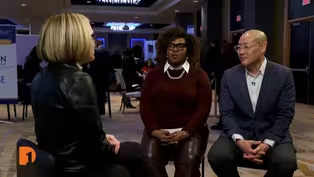
Black Tech Saturdays is building an inclusive tech ecosystem in Detroit
Clip: Season 9 Episode 31 | 5m 48sVideo has Closed Captions
The co-founders of Black Tech Saturdays discuss building an inclusive tech ecosystem in Detroit.
Johnnie and Alexa Turnage, co-founders of Black Tech Saturdays, are helping to increase African American representation and entrepreneurship in Detroit’s tech industry. One Detroit contributor Stephen Henderson talks with them at the 2025 Detroit Policy Conference about fostering an inclusive tech ecosystem in Detroit.
Problems playing video? | Closed Captioning Feedback
Problems playing video? | Closed Captioning Feedback
One Detroit is a local public television program presented by Detroit PBS

Black Tech Saturdays is building an inclusive tech ecosystem in Detroit
Clip: Season 9 Episode 31 | 5m 48sVideo has Closed Captions
Johnnie and Alexa Turnage, co-founders of Black Tech Saturdays, are helping to increase African American representation and entrepreneurship in Detroit’s tech industry. One Detroit contributor Stephen Henderson talks with them at the 2025 Detroit Policy Conference about fostering an inclusive tech ecosystem in Detroit.
Problems playing video? | Closed Captioning Feedback
How to Watch One Detroit
One Detroit is available to stream on pbs.org and the free PBS App, available on iPhone, Apple TV, Android TV, Android smartphones, Amazon Fire TV, Amazon Fire Tablet, Roku, Samsung Smart TV, and Vizio.
Providing Support for PBS.org
Learn Moreabout PBS online sponsorship- So I'm here with Johnnie and Alexa Turnage, the founders of Black Tech Saturdays.
Welcome to "One Detroit."
- Thank you for having us.
- And welcome to the Detroit Policy Conference.
You guys just got off stage where you talked about all of this excitement at Michigan Central and the book depository where you (indistinct).
But let's start with the idea for Black Tech Saturdays.
Where's it come from and what's the idea?
- Yeah, yeah.
So Black Tech Saturdays, we had a very organic beginning.
It was really in the beginning, me and another tech founder just getting together on Saturdays to work with each other, and then people would have questions.
And we were like, "You know what?
Instead of being here for six, seven hours, why don't we just open this up and see?"
At the time, we thought we'd be like maybe a cool safe space, a few nerdy like blurs.
And the very first BTS let us, and I was like, "This is different."
We had investors we had never met show up, people who were in tech that we were like, "Oh, we didn't know y'all existed organizations."
Someone from the DoD, and we're like, "All right, I think we need some more arms around this."
And the way we like to describe what the idea is, in 2023, it was building a safe space, and we did a lot of listening to what the community needed.
We saw tech founders, tech talent, and tech curious people like, actually, "I want to know more about the stuff.
I'm trying to break into this industry."
And 2024, we had a amazing year movement.
- Yeah.
I see you guys states everywhere.
- Right?
Everywhere.
And then we learned, I'm like, "There's a lot of people."
To date, we've had 19,000 people come out.
- Is that right?
- And this is our year that we understand, it's not only important that we continue to help and coach entrepreneurs, but creating pipelines to more procurement opportunities, more constructs.
It is about dollars in the pocket, not just for entrepreneurs, but for talent.
We have some amazing people upskilling and we've seen people who are like, you know, they just graduated from college.
And from being a greeter volunteering at BTS, they got that paid internship, and now they have a full time job.
We've seen people go from making $16 an hour to 85K, and it's really about how do you build the kind of community that Black and brown and underrepresented communities need to thrive in tech as Michigan becomes this new tech land.
- Yeah, I mean a lot of people would say, "Why do we need something like this in the early part of the 21st century?"
Right?
I always get people asking, "Well, things are a lot better for African Americans than they used to be, but there are still real hurdles and real barriers."
And just that feeling of I know a place where I can go and be myself and fit in and get connected to other people like me.
That's really important.
- It's super important.
I remember when me and Johnnie went to one of our first tech events.
We were the only underrepresented founders in the room and we're like, "Okay, well, what does it look like for us to come together?"
BTS is about anybody.
I don't care if you're Black, white, yellow, red.
It's an inclusive space where we can all come together to learn and grow and really drive innovation at a different level.
We are building some of the most resilient professionals, entrepreneurs, and take curious people who are just getting to their next milestone through workshops, through true access to new information.
And that's what's been, I think, our guiding light, just focusing on the people.
And we're deeply passionate about building those founders.
The storm of entrepreneurship is real and we're like, "How can we ground them and surround them with this community that can really help them to grow?"
- So I could plus one that though.
I mean, while we're farther into the future and we've come a long way, Black people only represent 7% of the tech industry.
We get less than 1% of VC capital.
Bank banking loans aren't actually that easy for entrepreneurs to get.
So I'm like, the capital's not there, the positions are harder because you're the only one.
The reason BTS came sticky is I'm like, even if you're working in corporate America, you have a community to go to on the weekend to meet some other people who do what you're doing.
Maybe during the week you all meet up at a coffee shop or... We've had people, they're going through courses together, they've taken on projects together.
And I'm like, it's just different when you have that power in the community.
I think Doug Song touched on it, really powerful.
The social capital is one of the most important parts of building an innovation community.
- Yeah.
- So innovation community.
I wanna talk about innovation because I think, you know, this is Detroit.
This is in many ways, you know, a huge center of innovation.
It has been for a long time.
When you say that word though, what do you guys mean by that?
What is innovation, what is innovative, and why is that so important?
- So when I say innovation, I think about innovation's a word that everybody throws out, but it's really a tool that gets to something.
And I think here in Detroit, innovation's about how we're getting towards prosperity and increased productivity.
How are we gonna do things and level the fact that (indistinct) in Detroit, the median income is $36,000, $33,000?
And I'm like, an innovation community is solving a problem, and the problems we have to solve in Detroit are great.
We have to make sure there is prosperity for all and people can see themselves in the future.
So we have a much more broader term.
It's not just the entrepreneurship service organizations or government, but how do we build prosperity for all and use technology as a vehicle to do that?
- Yeah, yeah.
What about you?
What's innovation?
- When I think about innovation, I just think about the fact that sometimes we forget as we approach Black History Month, Black and brown people have been building innovation, building tech tools for our country for generations.
And we have some of the coolest, dopest people here in Detroit.
When I think of Carla Walker-Miller, when I think of David Harver, who has been building and building groundbreaking things at the ground level, I just think of that.
That's what I think of when I think of innovation.
We have to remind our community, "Hey, we've been doing these.
These ideas that you've had in your head, let's see if we can cultivate that.
What does discovery look like in those situations to get you to your next step?"
Ford invests in the future of mobility in the Motor City
Video has Closed Captions
Clip: S9 Ep31 | 5m 56s | Michigan Central COO Carolina Pluszczynski talks about investing in the future of mobility. (5m 56s)
New report highlights Detroit-Ann Arbor Innovation Corridor
Video has Closed Captions
Clip: S9 Ep31 | 4m 40s | Richard Florida talks about the possibilities for the Detroit region’s innovation economy. (4m 40s)
The Song Foundation bridges gaps for Michigan entrepreneurs
Video has Closed Captions
Clip: S9 Ep31 | 6m 53s | The Song Foundation bridges gaps for entrepreneurs participating in the innovation economy. (6m 53s)
Providing Support for PBS.org
Learn Moreabout PBS online sponsorship
- News and Public Affairs

Top journalists deliver compelling original analysis of the hour's headlines.

- News and Public Affairs

FRONTLINE is investigative journalism that questions, explains and changes our world.












Support for PBS provided by:
One Detroit is a local public television program presented by Detroit PBS


